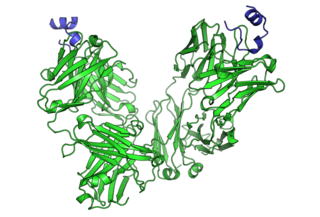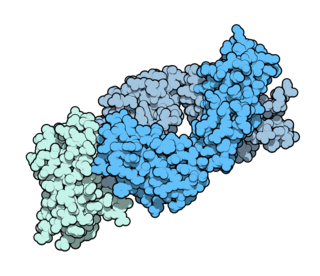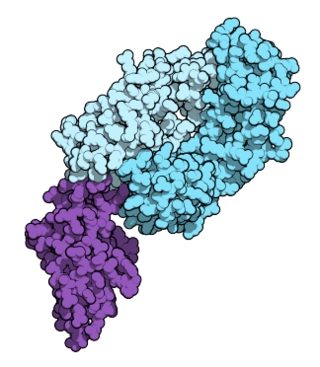Related Research Articles
Immunotherapy or biological therapy is the treatment of disease by activating or suppressing the immune system. Immunotherapies designed to elicit or amplify an immune response are classified as activation immunotherapies, while immunotherapies that reduce or suppress are classified as suppression immunotherapies. Immunotherapy is under preliminary research for its potential to treat various forms of cancer.

Cancer immunotherapy is the stimulation of the immune system to treat cancer,improving on the immune system's natural ability to fight the disease. It is an application of the fundamental research of cancer immunology and a growing subspecialty of oncology.

Ipilimumab,sold under the brand name Yervoy,is a monoclonal antibody medication that works to activate the immune system by targeting CTLA-4,a protein receptor that downregulates the immune system.
Medarex was an American biopharmaceutical company based in Princeton,New Jersey,with manufacturing facilities in Bloomsbury and Annandale,New Jersey,and research facilities in Milpitas and Sunnyvale,California. In 2009,Medarex was purchased by Bristol Myers Squibb.
Chemoimmunotherapy is chemotherapy combined with immunotherapy. Chemotherapy uses different drugs to kill or slow the growth of cancer cells;immunotherapy uses treatments to stimulate or restore the ability of the immune system to fight cancer. A common chemoimmunotherapy regimen is CHOP combined with rituximab (CHOP-R) for B-cell non-Hodgkin lymphomas.

Programmed cell death protein 1,also known as PD-1 and CD279,is a protein on the surface of T and B cells that has a role in regulating the immune system's response to the cells of the human body by down-regulating the immune system and promoting self-tolerance by suppressing T cell inflammatory activity. This prevents autoimmune diseases,but it can also prevent the immune system from killing cancer cells.
Adoptive cell transfer (ACT) is the transfer of cells into a patient. The cells may have originated from the patient or from another individual. The cells are most commonly derived from the immune system with the goal of improving immune functionality and characteristics. In autologous cancer immunotherapy,T cells are extracted from the patient,genetically modified and cultured in vitro and returned to the same patient. Comparatively,allogeneic therapies involve cells isolated and expanded from a donor separate from the patient receiving the cells.

Compugen Ltd. is a clinical-stage publicly traded predictive drug discovery and development company headquartered in Israel,with shares traded on the NASDAQ Capital Market and on the Tel Aviv Stock Exchange. Compugen was established as computational drug discovery service provider in 1993. Compugen originally acted as service provider for pharma companies,supplying its software and computational services to predict different types of biological phenomena. It had arrangements with big pharmas such as Novartis AG,Abbot Laboratories and Pfizer Inc. Subsequently,Compugen made a decision to become a drug development company with its own internal pipeline,and in 2010,decided to a focus on oncology and immunology. OncoMed Pharmaceuticals and Five Prime Therapeutics are among Compugen's competitors.

Nivolumab,sold under the brand name Opdivo,is a medication used to treat a number of types of cancer. This includes melanoma,lung cancer,malignant pleural mesothelioma,renal cell carcinoma,Hodgkin lymphoma,head and neck cancer,urothelial carcinoma,colon cancer,esophageal squamous cell carcinoma,liver cancer,gastric cancer,and esophageal or gastroesophageal junction (GEJ) cancer. It is used by slow injection into a vein.

Talimogene laherparepvec,sold under the brand name Imlygic,is a biopharmaceutical medication used to treat melanoma that cannot be operated on;it is injected directly into a subset of lesions which generates a systemic immune response against the recipient's cancer. The final four year analysis from the pivotal phase 3 study upon which TVEC was approved by the FDA showed a 31.5% response rate with a 16.9% complete response (CR) rate. There was also a substantial and statistically significant survival benefit in patients with earlier metastatic disease and in patients who hadn't received prior systemic treatment for melanoma. The earlier stage group had a reduction in the risk of death of approximately 50% with one in four patients appearing to have met,or be close to be reaching,the medical definition of cure. Real world use of talimogene laherparepvec have shown response rates of up to 88.5% with CR rates of up to 61.5%.

Pembrolizumab,sold under the brand name Keytruda,is a humanized antibody used in cancer immunotherapy that treats melanoma,lung cancer,head and neck cancer,Hodgkin lymphoma,stomach cancer,cervical cancer,and certain types of breast cancer. It is given by slow injection into a vein.

Immune checkpoints are regulators of the immune system. These pathways are crucial for self-tolerance,which prevents the immune system from attacking cells indiscriminately. However,some cancers can protect themselves from attack by stimulating immune checkpoint targets.
Hua Eleanor Yu is the inaugural Billy and Audrey L. Wilder Professor in tumor immunotherapy at the Beckman Research Institute of the City of Hope National Medical Center in Duarte,California. In addition,she co-leads the Cancer Immunotherapeutics Program at the City of Hope cancer center,with Dr. Peter P. Lee. Dr. Yu's laboratory was the first to identify STAT3,a protein that helps to protect tumor cells from the immune system. Her group is developing possible drug treatments using CpG-Stat3 siRNA to attack tumor cells in mice and humans.
Avelumab,sold under the brand name Bavencio,is a fully human monoclonal antibody medication for the treatment of Merkel cell carcinoma,urothelial carcinoma,and renal cell carcinoma.

PD-1 inhibitors and PD-L1 inhibitors are a group of checkpoint inhibitor anticancer drugs that block the activity of PD-1 and PDL1 immune checkpoint proteins present on the surface of cells. Immune checkpoint inhibitors are emerging as a front-line treatment for several types of cancer.
Checkpoint inhibitor therapy is a form of cancer immunotherapy. The therapy targets immune checkpoints,key regulators of the immune system that when stimulated can dampen the immune response to an immunologic stimulus. Some cancers can protect themselves from attack by stimulating immune checkpoint targets. Checkpoint therapy can block inhibitory checkpoints,restoring immune system function. The first anti-cancer drug targeting an immune checkpoint was ipilimumab,a CTLA4 blocker approved in the United States in 2011.
Antoni Ribas is a Spanish-American physician‐scientist. He is a Professor of Medicine,Surgery,and Molecular and Medical Pharmacology at the University of California,Los Angeles (UCLA) and Director of the Tumor Immunology Program at the Jonsson Comprehensive Cancer Center. Ribas served as president of the American Association for Cancer Research (AACR) in 2021-2022.
Andrew Mark Pardoll is Director of the Bloomberg-Kimmel Institute for Cancer Immunotherapy and Abeloff Professor of Oncology,Medicine,Pathology and Molecular Biology and Genetics at Johns Hopkins University,School of Medicine. He is also Director of the Cancer Immunology Program at the Sidney Kimmel Comprehensive Cancer Center.
Valerie W Rusch,MD,FACS,is an American thoracic surgeon who is currently the Miner Family Chair for Intrathoracic Cancers and Vice Chair for Clinical Research,Department of Surgery,at Memorial Sloan Kettering Cancer Center.
Julie Renee Brahmer is an American thoracic oncologist. She is the Co-Director of the Upper Aerodigestive Department within the Bloomberg~Kimmel Institute for Cancer Immunotherapy at Johns Hopkins University and the Marilyn Meyerhoff Professor in Thoracic Oncology.
References
- 1 2 "WEDDINGS; Suzanne Topalian and Drew Pardoll". The New York Times. June 20, 1993. Archived from the original on June 6, 2012. Retrieved May 16, 2021.
- ↑ "Wins music prize". The Record. March 26, 1966. Retrieved May 16, 2021– via newspapers.com.
- 1 2 3 4 "Melanoma Research Experts". hopkinsmedicine.org. Archived from the original on August 13, 2020. Retrieved May 16, 2021.
- 1 2 Piana, Ronald (June 3, 2016). "Surgical Oncologist Suzanne L. Topalian, MD, Shines at the Forefront of Groundbreaking Research in Cancer Immunotherapy". ascopost.com. Retrieved May 16, 2021.
- 1 2 "365 days: Nature's 10". nature.com. December 17, 2014. Retrieved May 16, 2021.
- ↑ Pollack, Andrew (June 1, 2012). "Drug Helps Defense System Fight Cancer". The New York Times. Archived from the original on June 2, 2012. Retrieved May 16, 2021.
- ↑ Topalian, Suzanne L. (June 28, 2012). "Safety, Activity, and Immune Correlates of Anti–PD-1 Antibody in Cancer". The New England Journal of Medicine . 366 (26): 2443–54. doi:10.1056/NEJMoa1200690. PMC 3544539 . PMID 22658127.
- 1 2 Reinberg, Steven (April 18, 2016). "Drug Seems to Extend Survival for Advanced Melanoma Patients". medicinenet.con. Retrieved May 16, 2021.
- ↑ "Dr. Topalian Named David Karnofsky Memorial Award Recipient for her contributions to the research of cancer". horizonweekly.ca. June 11, 2015. Retrieved May 16, 2021.
- ↑ "Johns Hopkins Physicians Elected to And Honored by Association of American Physicians and American Society for Clinical Investigation". hopkinsmedicine.org. April 26, 2016. Retrieved May 16, 2021.
- ↑ "Taubman Prize Jointly Awarded to Suzanne L. Topalian, MD, and Jedd D. Wolchok, MD, PhD, for Groundbreaking Work in Cancer Immunotherapy". ascopost.com. June 25, 2016. Retrieved May 16, 2021.
- ↑ "Seven Faculty Members Among New Electees to National Academy of Medicine". hopkinsmedicine.org. October 16, 2017. Retrieved May 16, 2021.
- ↑ "Faculty appointments and promotions: June 2018". hub.jhu.edu. June 20, 2018. Retrieved May 16, 2021.
- ↑ "Dragonfly Therapeutics Adds World-Leading Cancer Immunotherapy Experts to its Scientific Advisory Board". newswire.ca. October 8, 2018. Retrieved May 16, 2021.